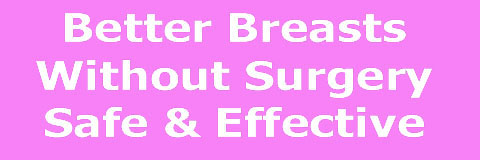
Breast cancer is one of the most frightening health conditions for any woman. Cancer is a disease characterized by abnormal cell growth and behavior. These malignant cells often reproduce rapidly and can metastasize to other surrounding anatomical regions.
Cancer cells interfere with normal organic processes and can prevent an organ or bodily system from adequately performing its crucial life functions. Cancer can erode the anatomy and weaken the individual to the point where the body either ceases to function, or more likely, some opportunistic secondary condition takes over and causes death.
Cancer of the breast is the fifth most common cause of cancer-related death worldwide and the most common cause of cancer-related death in women.
Breast Cancer Diagnosis
Being diagnosed with cancer of the glandular breast tissue is a devastating experience. Women understand that mammary cancer is serious and many equate it to a guaranteed loss of one or both breasts.
The diagnostic nocebo effect is extremely powerful when a doctor pronounces the very word cancer. All steps should be taken by every health care provider to minimize the negative emotional and psychosomatic physical effects which often accompany the diagnosis. Women must be given hope that they can beat cancer, not cursed with some dark omen hanging over their heads.
While many doctors do everything possible to reassure their diagnosed patients, some fall short of this goal and set the stage for an even more difficult process of battling the disease, thanks to the psychoemotional consequences of their dismal bedside manner.
Mammary Cancer Topics
Mammogram testing is a crucial component of cancer prevention.
Breast tumors come in many varieties and can be malignant or benign.
Breast lumps may or may not indicate cause for concern. However, all lumps should be evaluated by a qualified physician.
Breast exams and breast self exams should be performed according to the schedule set by your doctor.
Cancer survivors all cite that the experience changed has them. Losing a breast is a common consequence of cancer, but new treatments can spare many women this loss, while still eradicating the malignant growth.
Women should learn to recognize the various symptoms of mammary cancer in order to improve their chances of discovering the disease in its earliest stages.
Preventing breast cancer is just as important as treating it. Preventative methods can be very effective, especially for high-risk women.
Breast implant mammography can make cancer screening more uncomfortable and difficult. Make sure to always use a care provider with extensive experience in providing mammography testing to women with implants.
Recovering from mammary cancer is a true mindbody process of recuperation.
Breast implants and cancer might be related in some patients. Learn about the possible link between implants and cancer development.
What is cancer of the breast? This is a common question and the answer might actually be very surprising.
What causes cancer of the breast? This inquiry has puzzled medical researchers for decades. Science is closer to recognizing some contributory factors, but still does not have any universally applicable causes identified.
Male cancer of the breast is far less common than in female victims, but still affects many men each year.
Breast Cancer Facts
There is a wide range of cancers which can affect the breast tissue. Many are slow growing and easily treatable, while others are virulent and become metastatic in a short time frame.
Not all mammary cancer requires breast removal surgery and some may only require non-invasive therapies.
Women in developed industrial countries are more likely to develop cancer of the breast, but they are also more likely to beat the disease and fully recover.
Cancer has a hereditary component which may be transferred from one generation to the next thorough the genes. This so called “breast cancer gene” (BRCA) can be discovered during genetic testing. Women who demonstrate a genetic predisposition towards developing cancer of the breast should take extra precautions when it comes to early cancer screening, such as mammograms and regular self exams.
Cancer Symptoms
Symptomatic profile can vary greatly depending on the type of cancer which might be present. Some of the more common early warning signs of cancer of the breast include:
Lumps, bumps or masses below the skin surface, inside the breast tissue. Sometimes the lump might appear under the arm or even above the collarbone.
The breast skin might be red or inflamed, or might develop a texture akin to an orange. This rash might be painful or hot to the touch.
Any unusually change in the appearance, feel or sensory perception of the breast, or nipple, can indicate a potential problem.
Chronic unexplained fever, chills or breast pain might indicate a cancerous condition.
If you experience any of the above symptoms, seek professional medical guidance immediately.
Treatment of Mammary Cancer
Once diagnosed, most cancerous conditions are treated using one or more of the following modalities: radiation treatment, chemotherapy and pharmaceutical treatment or surgical treatment.
Mammary cancer surgery can be minimally invasive in the form of alumpectomy or can be far more drastic, such as a complete mastectomy.
Most cancers, which are caught early enough, can be cured and most women who receive appropriate timely treatment will recover completely.
Some women undergo removal of a non-cancerous breast as a precautionary measure once they have been diagnosed with cancer in the other breast. Some women who demonstrate a high risk of developing cancer of the breast actually undergo preventative removal of both breasts, even without a diagnosis of cancer.
Only your doctor can advise you as to the best courses of action you need to consider when it comes to preventing or treating cancerous breast conditions.
Breast Cancer Help
Preventing cancer should take priority in every woman’s life. Avoiding behaviors which are known to be harmful to your health is the best way of reducing your chances of experiencing a cancerous condition:
Try to maintain a healthy weight throughout your life. Obesity, and drastic shifts in weight, have both been linked to cancer and numerous other problematic conditions.
Do not smoke and be sure to limit alcohol consumption.
Eat healthy and limit fatty food intake.
Exercise regularly and stay active at every stage of life.
Avoid medications and antibiotics, except when absolutely necessary. Frequent use of medicines can suppress the natural immune system and may allow many potentially serious conditions to develop.
Talk to your doctor about what you can do to reduce your chances of becoming affected by cancer. Perform regular breast self exams and visit your physician or gynecologist for professional breast checkups regularly.
When indicated, make sure to undergo regular routine mammograms to check for early stages of cancerous growth. MRI and CT scans might also be a valuable part of a preventative cancer program.
Cancer of the breast can strike anyone; even men. However, just because it strikes you, does not mean that it will strike you down. Today’s advances in cancer treatment have empowered women to fight back harder than ever before and beat cancer time and time again.





